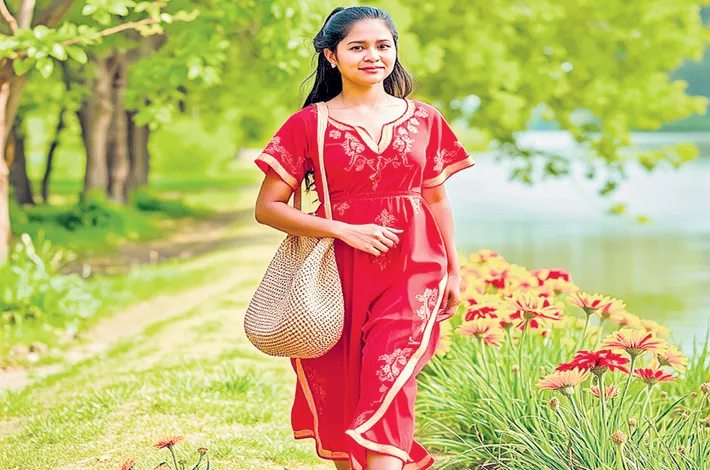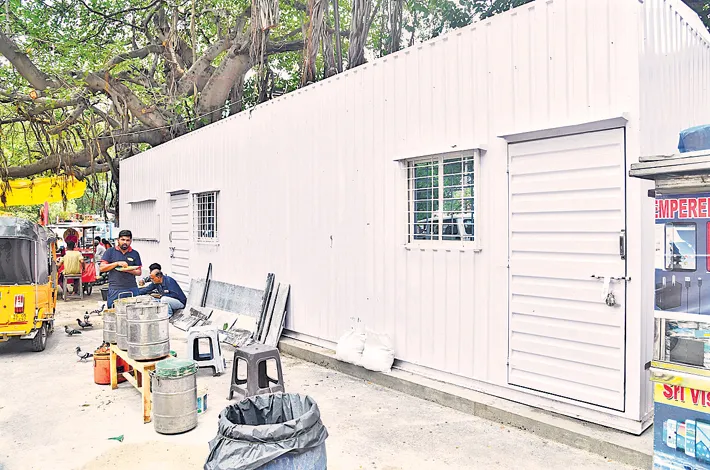The Song of the Singing River
31-07-2025 12:00:00 AM

In a lush, emerald valley of North East India, nestled between the misty hills of Meghalaya, flowed the Singing River. Its waters sparkled under the sun, and at night, it hummed a gentle tune that lulled the creatures of the forest to sleep. The Khasi people who lived nearby called it Umshiang, the river that sang, and they believed it was guarded by a kind spirit named Ka Lyrdoh.
In a small village by the river lived a girl named Aisha, who had eyes like polished amber and a heart full of curiosity. Aisha loved the river more than anything. Every morning, she would skip down the bamboo bridge, her bare feet pattering, to listen to Umshiang’s song. She’d sit on a smooth rock, her toes dipping into the cool water, and imagine the stories the river whispered—tales of ancient forests, talking animals, and hidden treasures buried in the hills.
But one summer, the river’s song began to fade. The once-clear waters grew murky, and the fish that danced in its currents vanished. The village elders shook their heads, saying the spirit of the river was angry. Aisha, however, didn’t believe Ka Lyrdoh could be cruel. “The river is sad, not angry,” she told her grandmother, Nong, who wove baskets under the shade of a jackfruit tree.
“Then you must find out why, little one,” Nong said, her eyes twinkling. “The river speaks to those who listen.”
Determined, Aisha set off along the riverbank, her woven satchel slung over her shoulder. She wore her favorite jainsem, a bright red dress with golden threads, which fluttered as she walked. The path wound through groves of betel nut trees and past limestone caves where bats chattered. Aisha listened carefully, but the river’s song was now a faint murmur, like a lullaby half-forgotten.
As she ventured deeper into the forest, she met a hornbill perched on a fig tree. Its beak was as bright as the sunrise, and its wings shimmered with iridescent feathers. “Why is the river sad, Kong Hornbill?” Aisha asked, bowing politely as the Khasi children did to honor forest creatures.
The hornbill tilted its head. “The river weeps because its heart is clogged. Follow the path to the Cave of Echoes, but beware—only a brave heart can face what lies within.”
Aisha thanked the hornbill and continued, her steps quickening. The air grew cooler as she neared the Cave of Echoes, a dark mouth in the hillside where the river seemed to sigh. Inside, the walls glistened with moisture, and her voice bounced back when she called, “Hello?” The deeper she went, the louder the river’s murmurs grew, now sounding like a cry for help.
At the cave’s heart, Aisha found a strange sight: a pile of shiny objects clogging a narrow stream that fed into the river. There were plastic bottles, glittering wrappers, and tangled nets, all glinting in the dim light. Aisha gasped. “This is why Umshiang is sad!” she said. The trash was choking the river’s flow, silencing its song.
But then, a shadow moved. A figure emerged from the darkness—a girl made of water, her hair flowing like ripples and her eyes glowing like moonlit pools. It was Ka Lyrdoh, the river spirit. “Who dares enter my cave?” she asked, her voice both gentle and stern.
Aisha stood tall, though her knees trembled. “I’m Aisha, and I want to help Umshiang sing again. Why is all this trash here?”
Ka Lyrdoh’s expression softened. “The people of the valley have forgotten me. They throw their waste into my waters, not knowing it hurts my heart. I cannot sing when I am choked.”
Aisha’s heart ached. She thought of the plastic bags she’d seen tossed by the market and the bottles left after festivals. “I’ll make it right,” she promised. “But I need your help.”
Ka Lyrdoh smiled, and a soft breeze carried the scent of wild orchids. “You have a brave heart, Aisha. Take this.” She handed Aisha a small, smooth stone that glowed faintly blue. “This is a river stone. It will call the creatures of the forest to aid you.”
Aisha ran back to the village, clutching the stone. She gathered her friends—Lila, who loved to climb trees, and Jiten, who could whistle like a mynah bird. She told them about the river’s sadness and Ka Lyrdoh’s plea. At first, they were skeptical, but when Aisha held up the glowing stone, their eyes widened.
Together, they rallied the village. The children made signs with bamboo and banana leaves, writing, “Save Umshiang! No more trash!” The elders joined in, and soon, everyone was at the riverbank, pulling out plastic, nets, and debris. Aisha held the river stone high, and a strange thing happened—monkeys swung down from the trees, otters splashed in the water, and even the hornbill swooped in, carrying twigs to help clear the mess. The forest creatures worked alongside the villagers, as if answering the stone’s call.
Day after day, they cleaned. The water grew clearer, and the fish returned, their scales flashing like tiny rainbows. One evening, as the sun dipped behind the hills, Aisha sat by her rock and listened. The river’s song was back—a melody of hope and joy, louder than ever. The villagers gathered, clapping and singing their own songs, blending with Umshiang’s tune.
That night, Ka Lyrdoh appeared to Aisha in a dream. “You’ve given me back my voice,” the spirit said. “Keep the river stone, and teach others to care for my waters.”
When Aisha woke, the stone was still in her hand, warm and glowing. She tucked it into her satchel and smiled. From that day, the village made a pact: no more trash in Umshiang. They built bins from bamboo, and the children took turns patrolling the riverbank, ensuring it stayed clean. Aisha became known as the River Keeper, and her story spread across Meghalaya, inspiring other villages to listen to their rivers.
And so, the Singing River sang on, its melody weaving through the hills, a reminder that even a small girl with a brave heart could make the world sing again.








